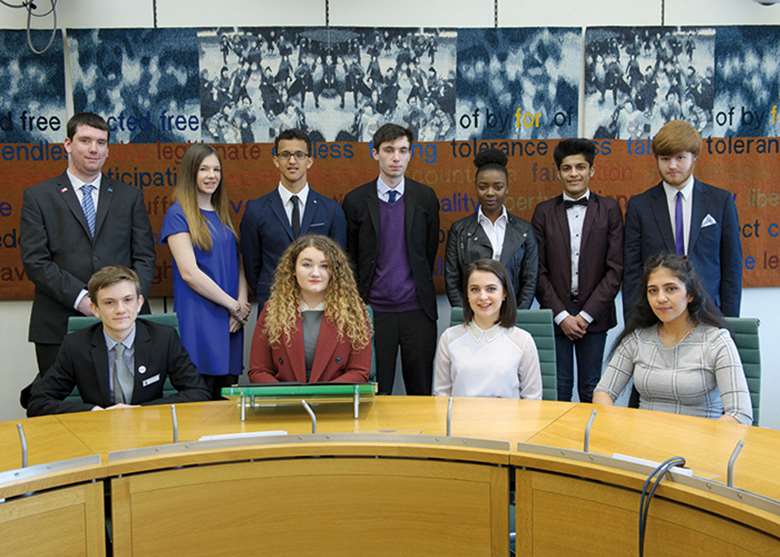Tackling discrimination in schools
Adam Offord
Tuesday, December 6, 2016
Councils should insist schools record and report incidents of racism and religious hatred, youth leaders say.

A youth select committee report has warned that racism and religious discrimination have become so normalised among young people that many see it as just "banter".
The group, hosted by the British Youth Council and made up of 11 young people aged 15 to 19, chose the topic as its focus for the year after racism and religious discrimination topped a 2015 ballot of nearly one million young people.
In Young people and the issues of racism and religious discrimination, the committee makes a series of recommendations for schools, local authorities and government based on written and oral evidence it received (see below).
It calls for local authorities to place a legal duty on schools to require them to record and report data on incidents of discrimination, including racism and religious discrimination.
"This would provide local authorities with better information on the prevalence of racism and religious discrimination in schools, and would provide Ofsted with information to inform their school assessments," the report says.
Schools in England and Wales were required to monitor and report all incidents of racist abuse to their local authority following an inquiry into the murder of teenager Stephen Lawrence in 1993.
However, in 2010 the Department for Education published guidance for schools on preventing and tackling bullying which removed this requirement. As a result, no national statistics on the prevalence of racist or religiously motivated incidents in English schools have been collated since, with figures collected only by councils that decide to prioritise the issue (see case study).
It also warns that witnesses told the committee of reluctance in schools to record incidents, with one young witness stating schools "need to present a certain image, so that their Ofsted report doesn't get damaged".
"We argue that without reliable and consistent statistics on incidents of discrimination in schools, the scale of the problem cannot be properly understood and therefore tackled," the report adds.
Bronagh Hughes, chair of the youth select committee, says that it is much more difficult to tackle discrimination in schools if nobody knows where it is happening.
"That is why this recommendation came in place because we thought if there is no record of incidents in schools, it would make it more difficult to tackle," she says.
"If we are aware of where it is occurring, it would be much easier to tackle because of the data."
She says that by recording and reporting incidents, the data could be collected and looked at on a national level, and support could be drafted into the schools or areas where incidents of discrimination are occurring the most.
The types of intervention and support that schools would receive could vary, but one aspect could be greater support and training for teachers so they can address the issues first-hand.
Hughes says the report has a number of recommendations for how the issue can be tackled and adds: "One recommendation is all about making sure the teachers are supported in dealing with incidents in schools.
"If we are aware of where it is happening, it would be much easier to direct that support.The fact young people themselves have identified this as an issue is just testament to how important it is to tackle this problem."
Case study: Data collection helps northumberland council respond to discrimination
Northumberland County Council has actively encouraged schools in its area to continue to report incidents of racism or religious discrimination by promoting how to make submissions and offering them "reassuring support".
It pays £16,000 a year to have workshops delivered by Show Racism the Red Card to 1,500 pupils to teach them about the issues and also offers every school and staff team free hate crime awareness workshops from Northumbria Police.
A community engagement officer from the police force is also willing to support any school where there has been an incident and when a parent still feels unhappy that a school has not dealt with an issue sufficiently.
"When there has been a particular problem, the community engagement officer can also make a police referral for a Northumberland school group to attend Safety Works [interactive safety centre] and experience interactive sessions relating to racist and religious hate crime," a council spokeswoman says.
"The information schools share with us occasionally contributes to a wider picture of community intelligence, which we share with the police - we can be sure that this information keeps schools and communities safe."
The authority also has a presence on the quarterly Independent Advisory Group, run by Northumbria Police, and can respond by sharing policing messages and being alert to potential threats and events such as extremist demonstrations.
In addition, it promotes police competitions about hate crime, and schools also have a point of contact if they are unsure how to deal with or follow up an incident.
Since the change in guidelines around schools reporting racist incidents, the number of reports by Northumberland schools has risen from 93 in 2010 to 113 in 2015.
Committee recomendations
- Teachers should receive better support to give them the confidence to tackle and report incidents
- Every school should involve young people directly in raising awareness
- Racism and religious discrimination should form part of the PSHE education syllabus
- Local groups should hold regular inter-race and inter- faith events to explore issues
- An advisory group should be set up which comprises representatives of government departments, service providers, council representatives, community, race and religious groups, and young people.
- The Government Equalities Office should have a minister who works exclusively on tackling discrimination
Source: Young people and the issues of racism and religious discrimination, youth select committee




